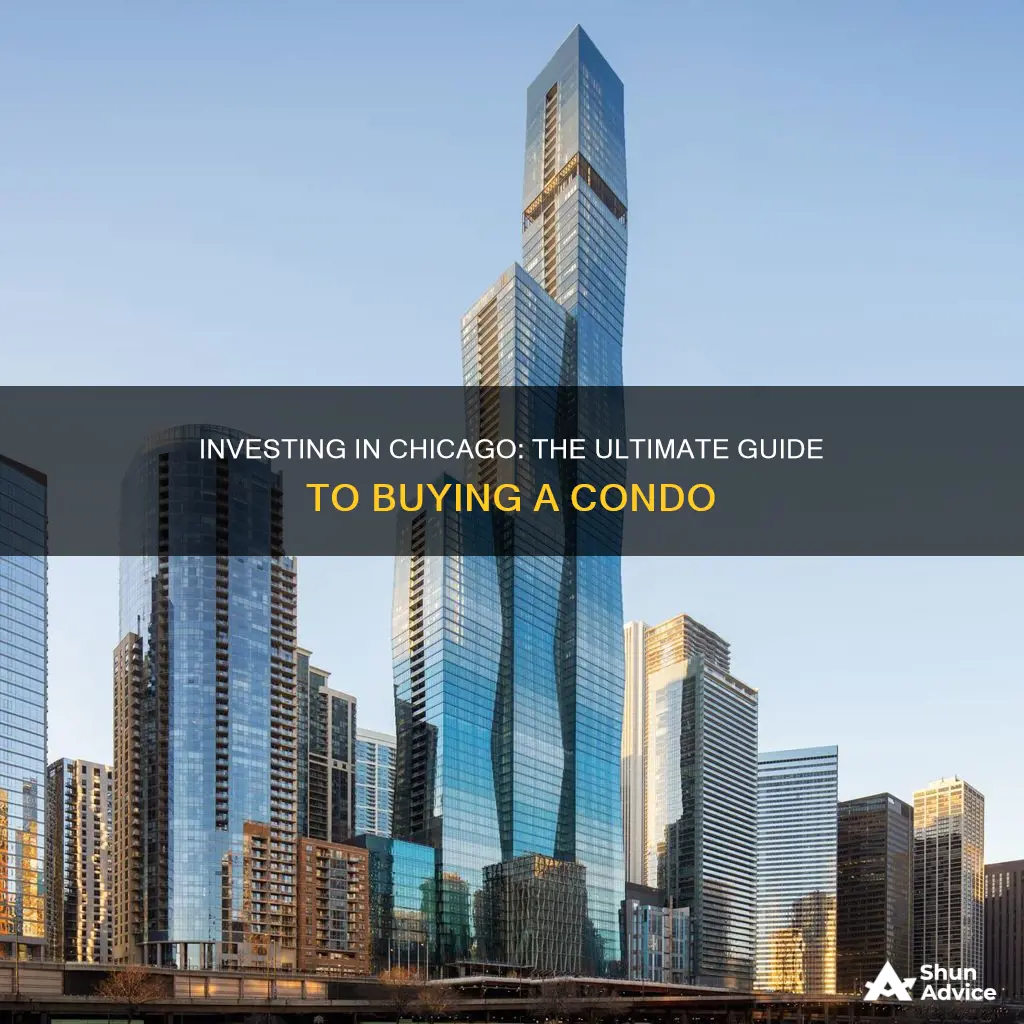
Chicago is one of the major cities in the U.S. where you can find affordable investment properties for sale. However, not every neighbourhood in Chicago is desirable for residents, and many desirable neighbourhoods are a poor choice for real estate investment.
The average property in Chicago costs just over $345,000. The average rent for a one-bedroom apartment is roughly $1,000, while two-bedroom apartments in Chicago cost an average of $1,300 a month.
There are several neighbourhoods in Chicago that present a great opportunity for investors. These include Rogers Park, Logan Square, Pilsen, Avondale, Humboldt Park, and West Town.
| Characteristics | Values |
|---|---|
| Average property price | $345,000 |
| Average property price per square foot | $260 |
| Average rent for a one-bedroom apartment | $1,000 |
| Average rent for a two-bedroom apartment | $1,300 |
| Average monthly condo fees | $1,000 |
| Average time to sell a house | 33 days |
| Number of active homes for sale | 5,313 |
| Number of condos for sale | 3,394 |
What You'll Learn

Understanding condo financing
If you need a mortgage to buy a condo, it's important to understand how condo financing works. Condos are typically more affordable than single-family homes, making them a great option for first-time buyers. However, obtaining a mortgage for a condo can sometimes be more challenging than for a single-family home due to the special underwriting requirements.
When you buy a single-family home, the process is relatively straightforward, with the bank appraising the property and checking for a clean title. However, with condos, the bank also considers the finances of the homeowner's association. They will want to review the condo documents and ensure there is no risk of the property depreciating. The bank will also likely inquire about the number of rented units and vacant units in the condo development, as this can impact the property's value.
For first-time condo buyers in Chicago, FHA and VA loans are popular options. To obtain an FHA loan, the property must be FHA-approved, with at least half of the units being owner-occupied. There are also restrictions on the number of units that can be behind on association dues and the number with existing FHA loans. On the other hand, VA loans require the entire condo complex to be approved by the Department of Veterans Affairs, and they offer qualified veterans the advantage of financing with a minimal down payment.
Before purchasing a condo, it is crucial to evaluate the financial health of the condo association. Request the financial statements and board minutes from at least the past two years to understand how they manage their finances and resources. Look for a well-managed budget, healthy reserves for emergencies and capital improvements, and adequate insurance coverage for the association's property. Remember, as a condo owner, you will be partially responsible for any financial issues within the association.
Lastly, don't hesitate to ask questions and seek resources to help you navigate the process. Working with a reputable real estate company in Chicago can provide you with valuable insights and guidance throughout your condo-buying journey.
Unlocking the Door to Investment: A Guide to Purchasing a Second Home
You may want to see also

The best ways to save for a down payment
Saving for a down payment on an investment condo in Chicago can feel like a daunting task, but there are several strategies you can employ to reach your goal. Here are some of the best ways to save for that all-important down payment:
Set Clear Savings Goals
First, you need to determine how much money you need to save. Calculate this by considering the purchase price of the condo, the minimum down payment required by your loan type, and any associated closing costs or other expenses. Conventional loans, for instance, typically require a down payment of around 3%, while FHA loans insured by the Federal Housing Administration require a minimum of 3.5%. Knowing your target amount will help you stay focused and motivated.
Automate Your Savings
Automating your savings is an effective way to save without constantly thinking about it. Set up automatic transfers from your checking account to your savings account, or arrange for a portion of your paycheck to be directly deposited into your savings. That way, you save effortlessly without having to remember to transfer funds manually each month.
Cut Back on Expenses
Scrutinize your budget to identify areas where you can cut back on spending. Reduce or eliminate unnecessary expenses such as subscriptions, entertainment, dining out, and delivery services. Also, consider negotiating lower rates on recurring expenses like insurance, internet, or cell phone plans. Remember, even small adjustments can make a significant impact over time.
Increase Your Income
Boosting your income will help you accelerate your savings. This could involve taking on a side hustle, freelancing, or starting a small business. You might also consider asking for a raise at your current job or looking for a higher-paying position elsewhere. Any extra income you generate can be allocated directly to your down payment fund.
Explore Down Payment Assistance Programs
There are various down payment assistance programs available, especially for first-time homebuyers. These programs can provide financial support in the form of forgivable or deferred loans, grants, or other incentives. Research local, state, and federal assistance options, as well as lender-specific programs. Taking advantage of these programs can help reduce the amount of money you need to save on your own.
Save Windfalls and Extra Income
When you receive a financial windfall, such as a tax refund, bonus, or gift money, allocate a portion (or all) of it towards your down payment fund. By doing so, you can give your savings a significant boost and reach your goal faster.
Monitor and Adjust Your Savings Plan
Regularly review your savings plan and progress towards your goal. This will help you stay on track and make any necessary adjustments. Visual aids, such as a savings thermometer or chart, can also help you stay motivated and celebrate your milestones along the way.
The Oracle's Next Move: Will Warren Buffett Invest in Amazon?
You may want to see also

The renter-to-owner ratio
When considering buying a condo in Chicago, it is important to keep in mind the renter-to-owner ratio of the building. A high renter-to-owner ratio can have several negative implications.
Firstly, according to Jennifer Mills Klatt of Berkshire Hathaway HomeServices KoenigRubloff Realty Group, a building with more than 50% of its units rented out can make it difficult for potential buyers to get a loan. This is an important consideration if you are planning to buy a condo as an investment property, as you may find it challenging to secure financing if the building has a high number of renters.
Secondly, a high renter-to-owner ratio can impact the level of care and maintenance of the building. Haakon Knutson, director of sales for The MG Group, notes that renters may not have the same level of investment in the property as owners. This could result in a lack of care for individual units and common spaces. Additionally, owners who are not living on-site may be less likely to approve spending money on improvements or necessary fixes, which could impact the overall value and desirability of the property in the future.
To make an informed decision, it is crucial to review the condo association meeting minutes, which can provide valuable insights into any issues or concerns within the building. It is also worth considering the benefits of buying a multi-family home in Chicago as an investment property. 2-flats, 3-flats, and 4-flats are common in Chicago and can be a great way to get into real estate investing without being limited to a medium-to-large apartment building.
When evaluating the renter-to-owner ratio, it is also essential to look at the broader trends in the Chicago housing market. According to data from the Chicago Metro Agency of Planning, the City of Chicago experienced a net decrease in renter-occupied units over the past decade, losing 21,064 renter-occupied units. This suggests a shift towards more owner-occupied units in the city. However, it is important to note that rental units still account for a significant portion of the housing market in Chicago, particularly in dense, older areas of the city.
In conclusion, when considering buying an investment condo in Chicago, carefully evaluate the renter-to-owner ratio of the building. A high ratio can impact your ability to secure financing and may affect the level of care and maintenance of the property. Review condo association meeting minutes and consider alternative investment options, such as multi-family homes, to make an informed decision. Additionally, stay informed about broader trends in the Chicago housing market to make a well-rounded assessment.
The Future is Now: Embracing Innovation Through Investments
You may want to see also

The average property price
It's worth noting that Chicago's real estate market is highly competitive, with low inventory and high demand. This dynamic often leads to multiple offers and bidding wars, giving sellers the upper hand in negotiations.
When it comes to condos specifically, the median sales price for a metro-area condo was about $92,600 less than a single-family home in May 2023, according to Zillow. However, it's important to factor in homeowners' association fees, which can vary depending on the building. Additionally, condos in the city tend to sell at a premium, with a typical unit selling for $53,900 more than a single-family house, as per Illinois Realtors data from May 2023.
While the condo market in Chicago is tight, with inventory down 90% from pre-pandemic levels, it still offers a more affordable option compared to single-family homes. For example, in the cramped Near North Side, it took about three months to sell a condo, while in areas with fewer high-rises, such as Uptown and North Center, it took only one month.
For those looking to invest in real estate, Chicago offers a range of options, from condominiums to multi-family homes and commercial properties. Condos, in particular, can be a great way to break into the market without breaking the budget, offering the rewards of ownership with less maintenance than a single-family home. However, due diligence is necessary to ensure a worthwhile investment in Chicago's competitive real estate market.
Understanding Dividends: A Guide to Unlocking the Power of Dividend-Paying Investments
You may want to see also

The best neighbourhoods to buy investment properties
Chicago is a great place to invest in real estate. Unlike other major cities like Los Angeles, New York, and San Francisco, Chicago's real estate market is relatively affordable. The city has a diverse economy, high-quality of life, and urban amenities, making it one of the most popular cities in the US to live in and invest in.
Rogers Park
Located in downtown Chicago on the north side, Rogers Park is one of the most diverse neighbourhoods in the city. It offers beautiful beaches and parks, dining options, art and culture galleries, and a vibrant nightlife. The neighbourhood is also home to Loyola University, which brings a lot of rental demand from students. The average home price in Rogers Park is $220,000 to $222,000, and the average rent is $1,199 per month.
Logan Square
Logan Square is a popular neighbourhood in Chicago, known for its sprawling eight-acre green space, Palmer Square. The area attracts a younger demographic, particularly millennials, with its tree-lined streets and classic greystone buildings. The average home price in Logan Square is around $450,000 to $500,075, and the average rent is $2,000 per month.
Pilsen
Pilsen is located on the west side of Chicago and offers a suburban vibe that attracts families. The neighbourhood has a mix of apartment buildings, single-family homes, and condos. The presence of the University of Illinois Chicago Campus brings a constant stream of students to the area. Pilsen is also popular among millennials for its trendy restaurants, shops, and boutiques. The average home price in Pilsen is around $300,000 to $350,000, and the average rent is $1,600 per month.
Avondale
Avondale is an up-and-coming neighbourhood in Chicago, comprising a middle-class population with many young professionals. It has good access to public transportation, with two train stations, and is in close proximity to I-90. Avondale has a vibrant nightlife, music venues, and culture. The median home price in Avondale is around $400,000, and the average rent for a three-bedroom home is about $2,000 per month.
Humboldt Park
Humboldt Park is a great neighbourhood for investors looking for available properties, as it is known for its foreclosed and distressed properties. Home values in the area were significantly impacted by the Great Recession and have not yet fully recovered. The average price of a home in Humboldt Park is $342,303, and the average rent is $1,700 per month.
West Town
West Town is a great neighbourhood for investors due to its low crime rate, walkability, and amenities. It has a suburban feel and is home to a mix of families and young professionals. The average home price in West Town is around $500,000, and the median rental rate is $2,400 per month.
The Power of Self-Investment: Unlocking Your True Potential
You may want to see also
Frequently asked questions
Condos are more affordable than single-family homes, making them a great option for first-time buyers. They often offer access to desirable amenities such as gyms and pools, and provide a maintenance-free lifestyle. Condos are also usually better connected to public transportation, making them a convenient option for those looking to live in downtown Chicago.
Condo financing requires special underwriting, as banks need to consider the finances of the homeowner's association. This includes reviewing condo documents and assessing the number of rented and vacant units to determine the property's potential for depreciation. FHA and VA loans are also available for first-time condo buyers, but they have specific requirements that must be met.
The average property in Chicago costs just over $345,000, but prices can vary depending on the neighborhood and specific amenities. Condos in desirable areas or with additional features may be more expensive.
Popular neighborhoods for buying investment properties in Chicago include Rogers Park, Logan Square, Pilsen, Avondale, Humboldt Park, and West Town. These areas offer a mix of affordability, high rental rates, and potential for appreciation.







